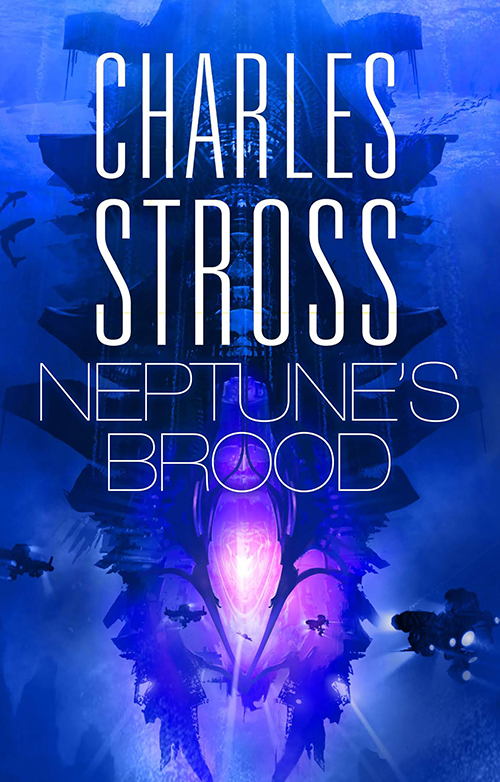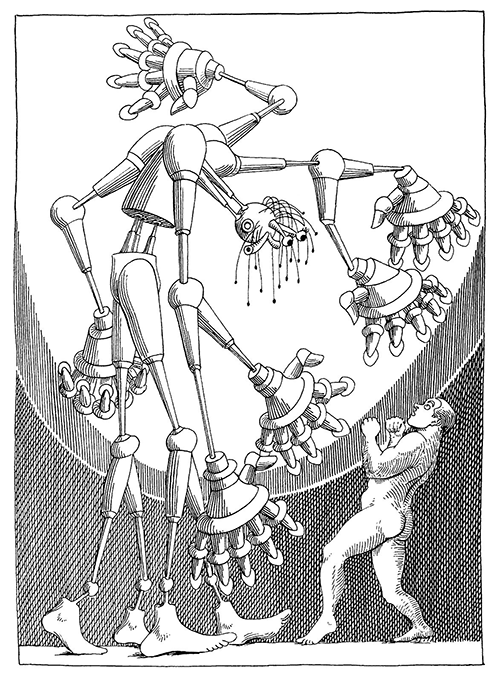I’ve recently finished Charles Stross’ Freyaverse series: the novel Saturn’s Children (2008), the short story Bit Rot (2010), and the novel Neptune’s Brood (2013). The books had been on my to-read pile for a while because I’ve enjoyed his other space operas, especially Glasshouse.
This cover for the UK edition was painted by Fred Gambino.
The premise of Saturn’s Children is fantastic. It’s set in a future where humanity has created colonies across the solar system, but has since died out, leaving our artificially intelligent robotic creations to carry on a post-human civilization without us. One important conceptual detail is that even though these are manufactured beings, their brains are basically the same as ours: human engineers couldn’t figure out how to create general artificial intelligence from scratch, so they built artificial emulations of human brains.
One could imagine a sort of Bechdel Test for SF books about robots: do two artificial intelligences talk to each other about something other than humans? These books would easily pass, although they’re still ultimately about humans: our foibles and narcissisms are on center stage.
In this future, sentience must be cheap, because it’s been installed in everything: hotels, giant passenger ships, even one-person disposable spacecraft. It does make me wonder if there are any cognitive difficulties with a basically human consciousness living in a xenomorphic body plan, although that’s a problem for transhumanism in general.
The main character, Freya Nakamichi-47, is a sex robot who was manufactured after the extinction of all her potential clients. As you might imagine, sex features prominently in Saturn’s Children. There’s also sexual assault. Neptune’s Brood, on the other hand, barely mentions sex at all.
A painting of Saturn eating his children, by Anonymous.
Stross has said that Saturn’s Children is a tribute to Heinlein’s novel Friday; I enjoyed it despite not being familiar with the inspiration. Saturn’s Children is an exciting tale with spies, double crosses, and secret identities that doesn’t shy away from the difficult realities of space travel. It also has an unreliable narrator, which is one of my favorite devices for building mystery and tension.
One world building detail I love is that, of course, a fully robotic space faring civilization wouldn’t have the same environmental requirements that we do, with our soft bodies and chemical intake needs; but not only do they consider free oxygen and dihydrogenous oxide unnecessary, they consider them dangerous: oxygen is highly combustible, after all, and water is corrosive! There’s another a hilarious bit about delusional robots who think they evolved while everyone else knows that they were designed.
Daniel Mróz drawing via the venerable Monster Brains blog.
The sequel, Neptune’s Brood, is even better. Set thousands of years after Saturn’s Children, our post-human descendants have created a truly interstellar civilization.
As both the epigraph and the worldbuilding make clear, Neptune’s Brood was inspired by David Graeber’s Debt: The First 5,000 Years, a truly fascinating book that I read last summer. When I was reading it, I noted that all the different debt and currency mechanisms Graeber describes among different historical human societies would be great systems to use as launching pads for SF or fantasy worlds, and I’m glad to see how Stross has taken that and run farther than I could imagine here!
Unlike Heinlein’s Friday and Saturn’s Children, Graeber’s Debt is a required prerequisite for Neptune’s Brood. I wouldn’t have grokked the financial concepts as quickly without that prior knowledge. Graeber took my understanding of what debt and money are and turned it upside-down, showing me how debt existed before money in Sumerian society, and that owing a debt isn’t really the negative thing we’ve flipped it into in our sickly individualistic society; instead, debts between people bind us together. Stross takes this idea that debt is foundational and uses it to extrapolate how the economy of an interstellar civilization that is actively colonizing solar systems would work, something I’ve never read before in a space opera, where solar systems just trade goods like they’re nations that share a world, or the utopian fully automated luxury gay space communism in Iain M Banks’ wonderful Culture series.
The ruins of Uruk, an ancient Sumerian city in what is now Iraq, where clay tablets were found that recorded debts. Photo from Getty Images via a BBC article explaining the discovery of ancient accounting practices.
In this age of scams, of Ponzi schemes large and small, from extractive capitalism’s impossible promise of endless economic growth, to cryptocurrencies, to constant robocalls trying to sell me extended warranties, I’ve become fascinated with scams, both the fraudsters who execute them and the clear-eyed individuals who see through the lies. They say that SF books don’t really depict the future but instead depict the present in a warped mirror, and in our scam-filled present, that is especially true of Neptune’s Brood, which portrays blockchains distributed between star systems and financial frauds that take centuries to pay off.
P.S. If you’ve read Neptune’s Brood, you should check out Stross’ crib sheet where he goes into more detail of the circumstances of writing the novel and provides commentary on the Freyaverse as a whole.




